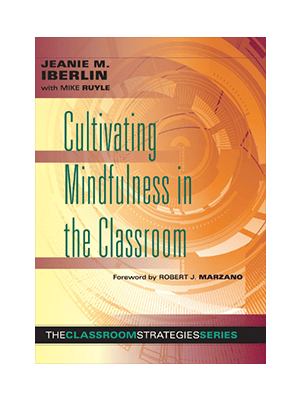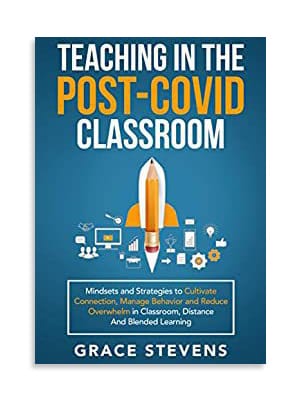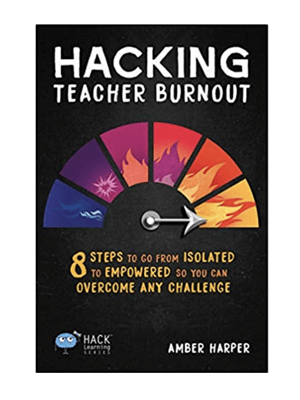In the chaos of modern life (and amidst a global pandemic), the concept of “self-care” has become an increasingly popular topic. Self-care, loosely defined, is a focus on the actions we can take to support our mental and physical health, especially in the face of increasing personal and professional demands. Unfortunately, for many teachers today, no amount of self-care can adequately address the stress and anxiety they feel.
This is due, in part, to the fact that most self-care involves “emotion-focused” coping skills: Activities such as mindfulness, gratitude journals, and aromatherapy work by changing our emotional responses. They help us react better to stressful situations, but they don’t actually tackle the source of stress (for example, mindfulness can help me remain calm in a fire, but it does nothing to put out that fire). The truth is – for many of us – we won’t get real relief until we change the situation. Here is where “problem-focused” strategies have a place, since they focus on actions to reduce or remove stressors (rather than just changing how we feel about them). Consider it this way: When we combine problem-focused strategies with the emotion-based strategies we have already acquired, we can both respond to and extinguish the fire. Let’s look at a few of those strategies now.
Problem-Focused Coping Strategies
Identify Your Stressors
If I am overwhelmed at work, I tend to lump everything together. When someone asks, “what’s wrong?” I have a tendency to say, “Work is just so stressful!” The problem is, when we generalize about the causes of stress, we tend to feel more helpless (and, in fact, others are less able to help us). This is why we must name the root cause(s) of stress. The best way to do this is to make a list of the biggest stressors in your life, and then use this list to consider practical ways to reduce them. “Making a plan” – even if you don’t have a lot of viable solutions right away – can reduce stress because it puts a sense of control back in our hands. More importantly, naming our concerns (and being honest about what we can personally change and what feels immovable) makes it easier to seek help from others. For example, maybe you don’t have a current solution to your burgeoning class sizes, but there might be people around you who can offer resources to manage your grading load or make group work more satisfying.
Step Away from Misery to Gain Instrumental Support
As the saying goes, “misery loves company.” If we’ve been teaching for awhile, we tend to join our colleagues in sharing our grievances. While this kind of emotional support can make us feel better in the short term (i.e. makes us feel less alone), it doesn’t really help long-term. If we want to actually reduce stress, we have to seek out instrumental support by connecting with school administrators, colleagues, or mentors who can help us find relevant solutions. If you don’t have a local network – go virtual! There are many education support groups online, and new published strategies emerge all the time. For example, as an English teacher I was always overwhelmed by my grading commitments and felt resigned to this because most of my colleagues felt the same. Then, a teaching acquaintance I met online sent me a copy of the book Fair Isn’t Always Equal, and it changed my entire approach (and greatly reduced my stress around grading and grades)!
Get Real About Your Time
Lack of time is a common teaching stressor, and while some of this is due to unrealistic expectations (both personal and societal), we may be able to tackle some of our concerns with better time management. This is one of the most valuable tips I’ve ever received: Schedule your work by time, not task. For example, if your typical schedule looks like an open-ended “to-do” list (e.g. “grade tests, record video lesson, and reply to parent emails”), you are more likely to spend too much time – more than is realistic or even humanly possible – on a single task. Instead, break your tasks into timed sessions. For example, rather than writing “grade tests” in your planner, schedule several 30-minute blocks of time. This approach forces us to be realistic about how long we can spend on a task (as there are only a limited number of hours in a day), and it also creates an accurate picture of our workload which we can use to seek meaningful solutions. Consider it this way: If you schedule 10 hours a week to record video lessons, but it consistently takes you twice as long, you owe it to yourself to ask your support network – including your administrators – how to better manage this task. This should not be your burden alone to solve.
Cut out “Hidden” Sources of Stress
In addition to tackling work-related stress, we can create more peaceful lives by addressing hidden sources of stress. For example, social media and tech use can be a hidden source of anxiety (especially now with so much happening in the world). While we might think “scrolling” Facebook or checking out Apple News every hour is a stress reliever, more often what we see ends up adding to our stress or general feelings of uncertainty. Many experts now say we should limit our use by scheduling it into our day, the same way we do with other activities.
Balance is Key
It’s important to realize that active problem-solving requires a lot of energy, so even if it can be more effective in reducing stress long-term, it is only beneficial if we give ourselves adequate breaks to recover and restore our strength. Put another way: To truly thrive in a high-stress environment, we need to balance practical, problem-solving strategies with healthy, emotional-based, self-care routines. Above all, we must continue to seek out – and share – new strategies that support our well-being.

























